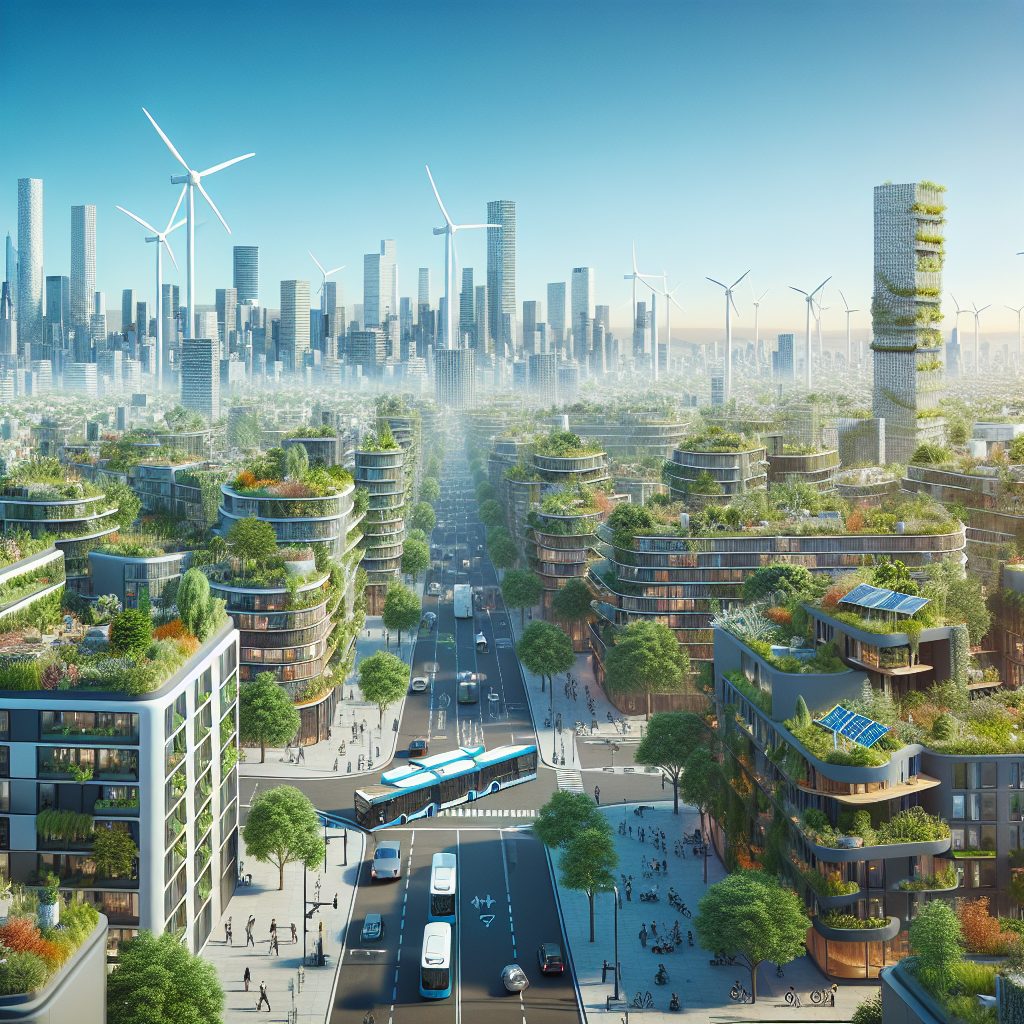
Urban air quality has become a hot topic of discussion, as more cities and countries face similar issues with air pollution. Air pollution results from the excessive emission of particulate matter, including nitrous oxides, sulphur dioxides and aerosols derived from industrial and vehicular sources. As a consequence of air pollution, cities with poor air quality suffer from decreased visibility, negative health effects such as asthma and bronchitis, and can even stimulate global warming. Improving urban air quality is an ongoing effort which requires commitment from both the public and private sectors.
One of the main methods for improving urban air quality is developing air pollution controls. This might include, for example, traffic management plans to optimize transportation routes, reduce excess highway capacity, bring existing roads and buildings up to standards, and enhance public transport lines. Other strategies may involve regulating factories and other sources of emissions, and creating clean air zones to reduce vehicular emissions. Smart investments in renewable energy sources such as wind, solar and geothermal can further reduce air pollution emissions and create a more sustainable future.
Key Takeaways
1. Air quality in urban areas can be improved through the implementation of technological solutions including air purification systems, pollution mitigation strategies, and green infrastructure.
2. Increasing focus on reducing the quantity of air pollution in urban areas should be emphasized due to its harmful effects on human health and quality of life.
3. To facilitate an improvement in air quality, policy makers, public health professionals, and environmental scientists must work together to address challenges such as air pollution and green infrastructure investments.
4. Policy makers must also prioritize the implementation of innovative urban air quality improvement projects, which can be funded through public or private investments as well as donations and grants.
5. In order to ensure a successful improvement in urban air quality, an effective and collaborative strategy must be developed to address the challenges associated with air quality in urban areas.
What are the Essential Steps Needed to Improve Urban Air Quality?
Urban air quality can rapidly deteriorate as the population in urban areas increases and the activities of people living therein. In order to reduce air pollution and improve urban air quality, there are a number of essential steps that should be taken.
Reduce Vehicle Pollution
Vehicles are a major source of air pollution in urban areas. By taking steps to reduce vehicle pollution, cities can significantly reduce the amount of air pollution in urban areas. This can be achieved by employing low emission vehicles such as electric cars and hybrids, increasing public transport use, and introducing incentives to encourage drivers to switch to public transport.
Improve Building Efficiency
Buildings can also be the major source of air pollution in urban areas. To reduce air pollution caused by buildings, cities can improve building efficiency by introducing energy efficiency standards, providing incentives for retrofitting existing buildings, and incentivizing the construction of new environmentally friendly buildings.
Develop Green Spaces
Green spaces are areas of vegetation and other natural features that are maintained for environmental protection. Developing green spaces can help reduce air pollution in urban areas by acting as a barrier to air pollution particles and trapping pollutants before they reach people’s homes and lungs. City dwellers can also benefit from green spaces by increasing oxygen levels and providing a pleasant respite in the urban landscape.
Implement Clean Energy Policies
Cities can reduce air pollution by implementing clean energy policies to reduce emissions from the burning of fossil fuels such as coal, oil and natural gas. This can be achieved by investing in renewable energy sources such as solar or wind power, energy efficiency measures, and replacing existing power plants with ones running on cleaner fuels.
Use Effective Waste Management Techniques
Proper waste management is essential for reducing air pollution in urban areas. This can be done by implementing policies to reduce the amount of waste produced, promoting the re-use of products and materials, and providing incentives for households and businesses to recycle their waste products.
Guide to Improving Urban Air Quality
- Introduce low emission vehicles.
- Improve building efficiency standards and retrofitting existing buildings.
- Develop green spaces in urban areas.
- Invest in clean energy sources such as solar and wind power.
- Implement effective waste management policies.
What are the factors which contribute to poor air quality in an urban environment?
The poor air quality in an urban environment can be attributed to many different factors, such as industrial activity, traffic emissions, and burning of fossil fuels. Industrial activity pollutes the air with chemicals and particulate matter, which can have long-term adverse effects on both human health and the environment. Traffic emissions from vehicles also contribute to air pollution, particularly in dense urban areas. Burning of fossil fuels for energy production and other purposes leads to the release of harmful gases into the atmosphere.
What is the most effective way to improve urban air quality?
The most effective way to improve urban air quality is to reduce emissions from activities that cause air pollution. This can be done by implementing improved technologies, such as hybrid or electric vehicles, that reduce emissions from vehicular traffic and transitioning to renewable energy sources, such as solar and wind power, for energy production. Additionally, urban development plans should focus on increasing green spaces and reducing reliance on polluting energy sources.
What are the benefits of improved air quality?
The benefits of improved air quality are numerous, including better air quality, reduced health impacts, and improved environmental health. Improved air quality leads to lower levels of air pollutants, which reduces the health impacts of air pollution, including respiratory diseases, cardiovascular diseases, and increased risk of some cancers. In addition, improved air quality can lead to better visibility, reduced acid rain, and improved overall environmental health.
What challenges may be faced when attempting to improve urban air quality?
The primary challenge faced when attempting to improve urban air quality is the need to balance environmental, economic, and social factors. Often, the needs of the environment come into conflict with the needs of industry and social development. Finding a way to balance these interests is important in order to reduce emissions and ultimately improve the air quality in urban environments. Additionally, many areas around the world only recently began to prioritize the importance of air quality, meaning that there is a lack of data and information available to guide decision making.
How can local citizens help to improve air quality in their cities?
Local citizens can help to improve air quality in their cities by taking action to reduce emissions. This includes reducing driving, choosing greener transportation options, and switching to renewable energy sources. Additionally, local citizens can participate in public campaigns or volunteer for community initiatives that aim to improve air quality in their cities. Finally, local citizens can spread awareness about air quality issues and the need for action in order to create sustainable and lasting solutions.
What legislation or policies are currently in place to improve air quality in urban areas?
Many countries and cities have implemented legislation or policies that are designed to reduce emissions from activities that pollute the air. These include measures that regulate the amount of emissions permitted, incentives for businesses and individuals to use cleaner and greener technologies, and funding for research and development of new technologies. Additionally, many countries have established air quality standards, which act as a guideline for actions that need to be taken in order to improve air quality.
What are some of the long-term health impacts of air pollution on humans?
The long-term health impacts of air pollution on humans can include an increased risk of respiratory conditions such as asthma and chronic obstructive pulmonary disease (COPD), as well as heart disease, stroke, and some forms of cancer. Additionally, air pollution has been linked to neurological problems, including impaired cognitive development in children, and damage to the nervous system in adults. Long-term exposure to air pollutants can also lead to an increased risk of premature death.
What can government officials do to improve air quality?
Government officials can take action to reduce emissions and improve air quality in their cities and countries by passing legislation that imposes restrictions on polluting activities and incentivizes the use of cleaner technologies. Additionally, governments can invest in research and development of new technologies and fund initiatives that reduce emissions. Finally, governments should invest in education programs that raise awareness about air pollution and its impacts.
Are there any other strategies to reduce air pollution besides technological solutions?
In addition to technological solutions, there are many other strategies that have been used to reduce air pollution. For example, urban planning initiatives that prioritize green spaces and public transportation can reduce emissions from vehicular traffic. Additionally, campaigns that promote energy conservation can help to reduce emissions from activities such as burning fossil fuels for heat and electricity. Finally, governments and communities can work together to develop emissions targets and plan initiatives that will reduce emissions and improve air quality in urban areas.
What kind of monitoring is necessary for effective air quality improvement?
In order to ensure effective air quality improvement, it is important to have a system in place for monitoring air quality. This includes establishing air quality standards and monitoring air pollutant levels to determine if those standards are being met. Additionally, monitoring should focus on understanding the sources of air pollution and their contributions to air quality, in order to develop targeted and effective mitigation efforts. Finally, a monitoring system should be able to detect changes over time in order to determine if improvement efforts are successfully improving air quality.
What role can the private sector play in improving urban air quality?
The private sector has an important role to play in improving urban air quality, by providing financial resources, technology, and expertise. Private businesses can finance projects that reduce emissions, or implement cleaner technologies within their own operations. Additionally, many businesses are voluntarily taking steps to reduce their environmental impacts and improve their operations in order to reduce air pollution. Finally, the private sector can lead by example and act as an advocate for air quality policies and regulations, which can help to support governmental efforts.
Final Thoughts
Urban air quality is an important issue that needs to be addressed in order to improve both human health and environmental health. Air pollution is a complex problem that requires careful consideration of both human and environmental needs in order to develop effective solutions. Reducing emissions from activities that pollute the air and implementing cleaner technologies are important steps in improving urban air quality. Additionally, governments, local citizens, and the private sector can all play an important role in promoting healthier urban environments.
Ultimately, improving urban air quality requires collaboration and the upholding of a shared responsibility. Governments, businesses, and individuals should all take action to reduce emissions and create cleaner and healthier urban environments. By taking these steps, we can work together to improve urban air quality and ensure a healthier future for generations to come.



